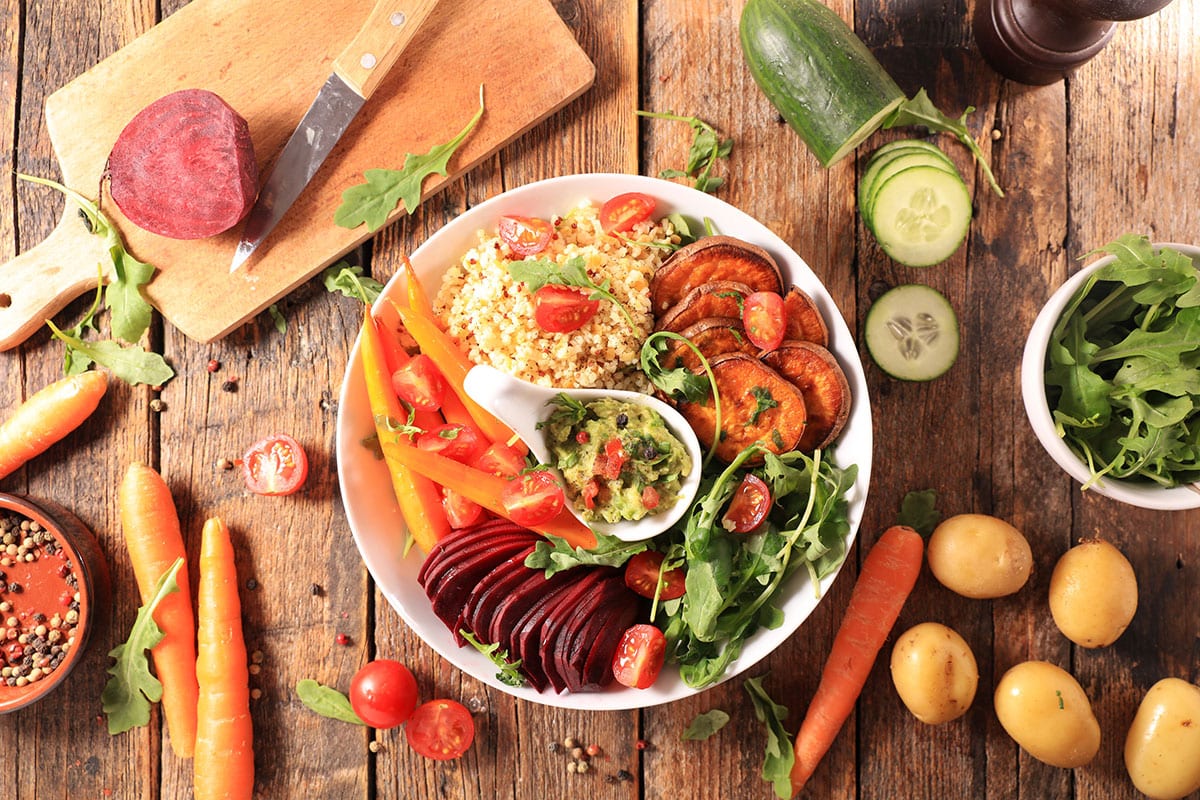Is a plant based diet the healthiest?
Is a plant based diet the healthiest? A plant based diet has become increasingly popular in recent years, but there has been some concern about whether it is the healthiest type of diet or not. In this article, we will look at this question in more detail to see if there are any health benefits to a plant based diet or if it can be seen as potentially harmful to your health.
Hopefully, I’ll give you some solid answers so you can make the best decision for your own health goals. Let’s start with talking about what a plant based diet actually is.
Plant Based Diet – Overview
A plant based diet consists of fruits and vegetables, whole grains, legumes/beans, seeds, nuts, and limited amounts of healthy fats like olive oil, rather than animals or animal products
This diet is generally low in fat and emphasizes a high intake of complex carbohydrates, fiber, and vitamins. It also typically restricts or excludes animal products such as meat (including fish and shellfish), poultry, eggs, dairy products, and even honey.
A plant based diet has been shown to promote various health benefits, including preventing certain types of cancer, heart disease, and diabetes, fighting inflammation, enhancing weight loss, and promoting longevity. Seventy percent of all deaths today are due to chronic diseases of our own making. An estimated 90 percent of type 2 diabetes, 80-90 percent of heart disease, and 40-70 percent of cancers are considered entirely preventable with the right kind of diet, precisely a plant based one.
That being said, most people on this kind of diet (like vegans) need extra vitamins such as vitamin B12 due to its deficiency in plant foods. So, while paying attention to a plant based diet, it’s good to note that other habits like tobacco smoking, alcohol consumption, sedentary lifestyle, and unhealthy diets (including plant based foods) also play a bigger role in promoting health and wellbeing. So fill your plate with healthy plant-based foods and ensure you ditch any unhealthy foodstuff.
To start moving into a plant-based diet, experts say to fill half of your plate with veggies at lunch and dinner, and then start thinking of meat as a garnish instead of the main course. Read How To Transition To A Plant-Based Diet.
Let’s expound on the health benefits of a plant-based diet. Read More.

The Health Benefits of Plant Based Diets
1. It may lower your blood pressure and improve heart health
According to scientific studies, high blood pressure is a common denominator in stroke, heart disease, and diabetes, and the food you eat has a significant part to play.
Animal products are generally high in saturated fat and cholesterol. This can block your blood vessels, causing your body to build up pressure to try and force-pump blood through the occluded vessels.
However, plant foods do not contain cholesterol and are typically low in unsaturated fat, making them suitable when managing or reversing any lifestyle heart-related condition.
Plant foods are also high in nitric oxide, which helps dilate and relax blood vessels, causing a drop in blood pressure with an increased blood supply to different organs.
Besides, plant foods are also high in heart-protective nutrients, including phytochemicals, antioxidants, vitamins, mono- and polyunsaturated fatty acids, and n−3 fatty acids. Read More.
2. A Plant-Based Diet May Lower The Risk Of Cancer.
Although cancer is the second leading cause of death worldwide, adopting a plant-based lifestyle can drastically bring down the numbers.
This is because phytochemicals and antioxidants in plants can help neutralize free radicals that might otherwise cause oxidation and mutation of cells, causing cancer.
Eating mainly plants may also slow the progression of certain cancers such as colon, prostate, and breast cancer. Read More.
3. A Plant-Based Diet Could Help You Lose Weight
If you’re looking for ways to make weight loss easier, a plant-based diet could be just what you need. Studies have shown that those who abstain from meat, eggs, and dairy products can experience health benefits like weight loss. Omnivores tend to consume more calories per day than vegans and vegetarians, which translates into more weight gain over time.
In addition, the high levels of saturated fat in animal foods is a significant contributor to insulin resistance which causes poor blood glucose regulation leading to fat storage, weight gain, obesity, and even diabetes. Studies also show that meat-eaters are more likely to suffer from higher rates of obesity and type 2 diabetes than non-meat eaters—and their risk of death is 25 percent higher!
Plant-based diets are also high in dietary fiber, which causes you to feel full for longer, thus preventing unnecessary snacking, a pivotal contributor to weight gain.
But note that the weight loss benefits of a plant-based diet can only be expected from whole and minimally processed foods. This is because highly processed plant foods like white flour have no nutritional benefits but are high in sugars, contributing to inflammation, obesity, and other metabolic conditions like type 2 diabetes. Read More.

4. It May Improve And Reverse Type 2 Diabetes.
Yes, type 2 diabetes is 100 percent reversible with a lifestyle change. The only problem is that people have been made to believe that once you are diagnosed with any chronic disease like diabetes, that’s it. You’ll have to take the pill for the rest of your life, but that’s not true.
According to studies, whole food plant-based diets with minimal to no intake of refined foods and animal products have been shown to help prevent and treat type 2 diabetes.
A 2016 study found that high-quality plant based foods reduced the risk of developing type 2 diabetes by 34 percent. A different study published in Diabetic Care compared the effects of a vegetarian and vegan diet in preventing type 2 diabetes. At the end of the study, a vegan diet was shown to have a reduced risk of developing the condition than those who included animal foods in their diet. So with a proper diet of plant-based foods, type 2 diabetes is completely manageable and reversible.
5. A Plant-Based Diet Can Help Calm Your Nerves
Contrary to your desire to stay healthy, regular ups and downs, mood disorders, and even major life traumas can mentally push you to that tight spot.
And in a world where every problem seems to have a pill, dietary approaches are rarely mentioned.
The good news is, whatever is happening around you may be out of your grasp, but you can bounce back to the comfort of healthy plant-based foods.
For example,
Bananas are rich in tryptophan, an amino acid that stimulates the release of serotonin, a mood stabilizer. Serotonin can also enhance your sleep pattern. Read More.
Berries are high in anthocyanin and antioxidants, which can improve moods and protect your brain against overthinking. Read More.
Oats are rich in complex carbohydrate that stimulates the release of the feel-good chemical, serotonin, which soothes and relieves stress. Read More.
Leafy greens such as kale, chard, spinach, and arugula are rich in magnesium which can help regulate the stress hormone cortisol. They’re also rich in folate, a primary culprit in the release of another feel-good chemical, dopamine. Read More.
6. It May Balance Your Blood Sugar Levels
Plant-based diets are associated with lower blood sugar levels and less insulin resistance. A well-rounded, whole food (plant-based) approach naturally balances your blood sugar, reducing hunger and cravings—helping you lose weight by stabilizing your energy needs. By choosing more whole plant foods in place of processed foods, you’ll keep your blood sugar in check and curb those sweet cravings. In addition, whole plant foods contain tons of fiber, which can help fill you up quicker and better control how much you eat.
7. A Plant Based Diet May Lower Your Risk of Cancer
A number of studies have looked at whether there is an association between eating meat and developing cancer. Most found that people who eat more meat have higher rates of certain cancers, including breast, colon, and prostate cancer. There are also indications that red or processed meats can cause colorectal cancer. One meta-analysis combined data from 21 different studies and found that every 50 grams (1.8 oz) daily serving of processed meat increased your risk of colorectal cancer by 21%.
Plant based foods like fruits, vegetables, nuts, seeds, and legumes are full of antioxidants and other phytochemical compounds that fight inflammation and destroy free radicals that may cause cell damage leading to cancer formation. These protective nutrients may also benefit those already diagnosed, preventing cancer progression and the risk of cancer-related mortality.
6. Reduces Inflammation
Major diseases that affect us today, such as diabetes, heart disease, Alzheimer’s, arthritis, depression, and cancer, have been linked to chronic inflammation.
Consuming plant foods high in anti-inflammatory markers can help treat and relieve the symptoms of these illnesses. Read More.
Best anti-inflammatory plant foods include
- Tomatoes
- Fruits such as strawberries, blueberries, cherries, and oranges,
- Nuts such as almonds and walnuts
- Leafy greens such as kale, collards, and spinach
- Olive oil
Foods that cause inflammation include
- Sodas
- Fried foods
- Refined carbohydrates
- Lard
- Processed meat
- Sugar
The Drawbacks of Following a Plant Based Diet
A plant-based diet emphasizes consuming plant foods as much as possible and minimizing or eliminating animal products from the diet entirely. While this approach to eating is without a doubt good for your health, it does come with some potential drawbacks that you should fully understand.
a. Protein insufficiency
When you talk about a plant based diet, most people associate it with fruits and vegetables; however, this alone cannot provide you with sufficient amounts of protein. To meet your daily requirements, ensure you regularly incorporate legumes such as beans, lentils, peas, and chickpeas, seeds, nuts, and healthy fats like avocado into your meals.
b. B12 deficiency
B12 is an essential nutrient that’s, unfortunately, lacking in a plant based diet. Food sources such as mushrooms, seaweed, nutritional yeast, and fortified foods may help up your intake, but to sufficiently meet your daily needs, consider including a vegan vitamin B 12 supplement.
c. Iron deficiency
Various plant foods like legumes, seeds, and vegetables are high in iron. However, the type of iron in plants is complex for the body to absorb due to high antinutrient levels in plants. Yet pairing such foods with vitamin C-rich foods can increase iron absorption. Also, avoid caffeine, especially after meals, as it has been shown to inhibit iron absorption.
d. Highly processed plant based foods can be harmful
Plant based foods can be classified as processed and whole plant based foods. While whole plant based foods are rich in nutrients, highly processed foods can be harmful to your health.
Processed foods are often high in added fats, sugar, and salt. Essential nutrients such as fiber, vitamins, and minerals, are also destroyed during processing. So no matter how often you consume such foods, they can only increase inflammation, weight gain, and your risk of diseases with no health benefits whatsoever.
So, is a Plant Based Diet the Healthiest?
The answer to whether a plant based diet is the healthiest is entirely relative to the kind of plant foods you choose to consume. A whole plant based diet means eating unprocessed, whole plant foods with all their nutrients in place.
This is the most beneficial kind and the one associated with all the benefits of a plant based diet. It’s high in nutrients, including fiber, healthy fats, antioxidants, and various vitamins and minerals. A highly processed diet, however, has all its nutrients reaped off. Such foods also tend to have many additives, including artificial ingredients.
In addition, some potential nutrient deficiencies associated with plant based foods may make the diet seem less healthy, but with the right planning and proper supplementation, a whole food plant based diet could be all you need for good health and wellbeing.
Tips to Make a Plant Based Diet Work For You
If you want to try eating a vegan, vegetarian, or any other form of a plant-based diet but are worried that you’ll miss out on key nutrients and vitamins, there are ways to ensure your food plan covers all your nutritional bases, such as
- Always incorporate legumes into your diet
- Include nuts and seeds in your morning smoothies or sprinkle on salads or add to pastries
- Add vegetables to every meal
- Incorporate seasonal fruits
- Don’t forget a B12 supplement
- Avoid processed plant-based foods
- Learn from others
- Always pair your iron-rich foods with vitamin-rich foods
Final Thoughts
A plant-based diet is often recommended for those who wish to become healthier. Many benefits go along with eating this kind of diet, but what’s more important is to focus on consuming nutrient-rich foods, such as fruit, vegetables, nuts, seeds, and whole grains.
When considering how healthy your eating plan is, it’s important to consider your food sources and how these foods are prepared.
While whole plant based foods are full of benefits, highly processed plant foods can turn out harmful to your health. Also, keep in mind the necessary supplementation to include.
Although a plant-based diet doesn’t mean you never eat meat or dairy, research shows that eating more foods from plants could significantly help improve health and major diet-related illnesses.
Sticking to healthier items like fresh fruits and veggies, whole grains, nuts, and legumes. Limiting sugary beverages and refined carbohydrates is a great way to enjoy the amazing benefits of a plant-based diet.
Other Similar Articles
- Start A Vegan Diet
- How To Transition To A Plant-Based Diet
- What’s The Difference Between A Vegan And A Vegetarian
- Gluten-Free Vegan Shopping List
- Plant Iron Sources
- Is Vegan Gluten-Free
- Jamaican Vegan Recipes
- How Many Grams In An Ounce
- Celsius To Fahrenheit Chart
- What’s The Difference Between A Vegan And A Vegetarian
- Vegan Whipped Shea Butter
- How Many Teaspoons In A Tablespoon
- Gluten-Free Vegan Shopping List
- Best Gifts For Vegans

If you enjoyed this post about, Is a plant based diet the healthiest? and would love to see more, join me on Youtube, Instagram, Facebook & Twitter!
Get discounted copies of my cookbook here.
Also please leave a star rating ;-)
Need some encouragement on your Healthier Steps journey?
Join our Facebook groups, sharing lots of delicious vegan and gluten-free recipes, health tips, etc., from our members. Please join us and invite your friends to Gluten-Free and Vegan For Beginners and Vegan Recipes With Love.








more people are suffering from cancer
Diabetes
much weight
high blood pressure
inflammations
i am adventist from Rwanda i love this website100% healthiersteps good names
Welcome, Elisaphan to our website.Thank you.
Dear founder r of this website ,thank you for your initiative of creating this website ,in our country many people are suffering from different diseases caused by malnutrition , i know this website from January /2021 i am in Rwanda,this web is like hopital, continue to help us God bless you
Jeanne. I’m so sorry to hear that. Thank you for visiting our website, we really appreciate it.
Very important benefits of a plant-based diet .everyone need to know these 6benefits
interesting news for this website GOD BLESS THIS WEBSITE
thank you so much for 6 benefits of plant based diet ,i am very happy to know how they can help lower your blood pressure and improve heart health ,thank you for these good new